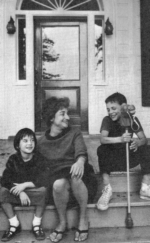 SKC Films Library SKC Films Library |
|
|
| SKC Films Library >> Sociology >> Women |
 Betty Friedan Betty Friedanco-founder of the National Organization for Women Betty Naomi Goldstein was born in Peoria, Illinois, on February 4, 1921. Her father was a very successful jeweler; her mother had given up her job with the local newspaper when she got married, and always urged Betty to pursue the journalism career that she had been forced to give up. She graduated summa cum laude from Smith College in 1942 and was given a research fellowship to study psychology as a graduate student at the University of California at Berkeley. She spent a year at Berkeley before deciding she didn't want to go into academia and moved to New York City, where she began working as a freelance journalist. In 1947, Betty married Carl Friedan. Breaking from the then established role for married women, she chose to continue her freelance writing while raising the couple's three children. After Carl established his own advertising agency they moved to Rockland County, New York, and Betty took up the life of a then typical suburban housewife. In 1957, Friedan sent a questionnaire out to many of her college classmates asking them to comment on how their on-going lives compared with the lives they had hoped to have while in college. Many of the respondents expressed dissatisfaction with their lives, especially regarding the career goals they had been forced to give up in order to get married. Friedan wrote an article based on the responses, but the women's magazines with which she previously worked refused to publish the piece. So, she decided to further her research and publish the results in book form. The Feminine Mystique, published in 1963, identified a condition Friedan claimed women suffered from that was a direct result of society's expectations that they place the home above themselves, and called upon women to shed their domestic confines and discover other meaningful endeavors. The book was an instant success, and over three million copies were ultimately sold. In 1966, Friedan helped found the National Organization for Women, which worked for political reforms to secure women's legal equality. One of NOW's first causes was to call for enforcement of Title VII of the 1964 Civil Rights Act, which prohibits employment discrimination on the basis of sex. As a result of NOW's efforts, the Equal Employment Opportunity Commission (EEOC) ruled that airlines could not fire female flight attendants because they married or reached the age of 35. It also ruled that jobs could no longer be advertised according to male or female categories. NOW also lobbied for passage of the Equal Rights Amendment (unsuccessfully), for federally funded day care centers, and for the legalization of abortion and the preservation of abortion rights. She was also a founder of the National Abortion Rights Action League, and of the National Women's Political Caucus. In 1970, Friedan lobbied against President Richard Nixon's nomination of G. Harrold Carswell to the Supreme Court. In testimony before the Senate Judiciary Committee, she said that, in 1969, Carswell had defied the Civil Rights Act by ruling in favor of the right of employers to deny jobs to women with children. Carswell's nomination was ultimately rejected. At NOW's annual meeting in 1970, Friedan called for a Women's Strike for Equality. On August 26th (the 50th anniversary of the day women gained the right to vote) demonstrations, marches, and speeches were held in 40 major cities across the country. Friedan herself led a parade of over 10,000 down Fifth Avenue in New York City. As the years went by, Friedan took a less prominent role in NOW and concentrated more of her efforts on writing and teaching. In 1976 she published It Changed My Life: Writings on the Women's Movement, a combination autobiography and compilation of articles. The Second Stage (1981) called for a shift in the women's movement that took the man's role in society into account and urged both sexes to break from past stereotypes. In The Fountain of Age (1993), Friedan argued that the rights already granted to women should be extended to the elderly, especially those regarding fair employment. Betty Friedan died of heart failure on her 85th birthday, February 4, 2006. SEE ALSO |
SKC Films Library >> Sociology >> Women This page was last updated on February 03, 2017. |